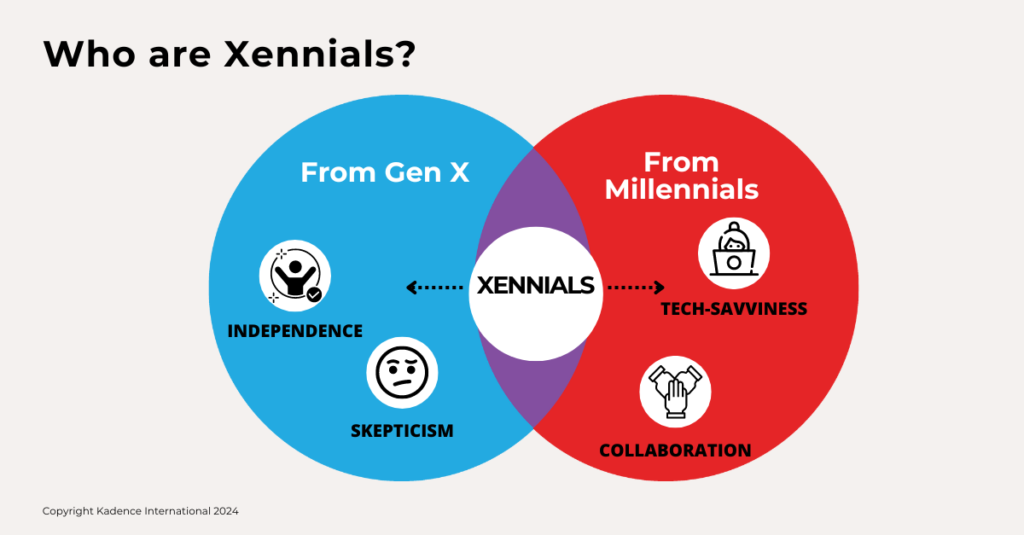The term Xennials refers to a micro-generation born between 1977 and 1983, though some definitions extend this range slightly. This unique cohort is often described as a “bridge” between Generation X and Millennials, sharing characteristics of both generations while carving out its own identity. Xennials have gained recognition for their distinct experiences, shaped by the rapid technological, cultural, and economic changes of the late 20th century. This article explores the origins, defining traits, and cultural significance of Xennials, as well as their unique position in the generational spectrum.
Origins of the Term

The term “Xennials” is a blend of Generation X and Millennials, coined to describe individuals who don’t fully identify with either generation. It was first introduced in a 2014 article by Sarah Stankorb and Jed Oelbaum in GOOD Magazine. The authors described Xennials as a micro-generation that serves as a bridge between the disaffection of Gen X and the optimism of Millennials. The term resonated with many who felt left out of the usual generational labels, and it has since gained widespread recognition.
In 2021, “Xennials” was added to the Oxford English Dictionary, defined as “a person born between the late 1970s and early 1980s, after (or towards the end of) Generation X and before (or at the beginning of) the millennial generation.” This formal acknowledgment solidified the term’s place in the cultural lexicon.
Defining Traits of Xennials

Xennials are often described as having had an analog childhood and a digital young adulthood, making them uniquely positioned to understand both pre-internet and internet-driven lifestyles. This duality has shaped their worldview and contributed to their adaptability in a rapidly changing world. Some defining traits of Xennials include:
- Technological Transition: Xennials grew up with rotary phones, VHS tapes, and floppy disks but were young enough to embrace the digital revolution of the 1990s and 2000s. They remember the sound of dial-up internet and the excitement of their first email accounts, yet they also adapted quickly to smartphones and social media.
- Cultural Touchstones: Xennials share cultural experiences with both Gen X and Millennials. They remember iconic moments like the rise of MTV, the original Star Wars trilogy, and the early days of AOL. They also experienced the transition from landlines to cell phones and from physical media to streaming services.
- Economic Resilience: Xennials entered the workforce during a period of relative economic stability but faced challenges like the dot-com bubble and the 2008 financial crisis. These experiences have made them resourceful and pragmatic, often balancing the cynicism of Gen X with the optimism of Millennials.
- Relationship Dynamics: Xennials often formed relationships before the rise of social media and dating apps, relying on landlines and face-to-face interactions. This has given them a unique perspective on communication and connection in the digital age.
Why Xennials Matter

As a micro-generation, Xennials often serve as a bridge between the disaffection of Gen X and the optimism of Millennials. They are uniquely positioned to navigate generational divides, offering insights into how different age groups approach technology, work, and relationships. Their adaptability and resilience make them valuable contributors to the workforce and society at large.
Xennials also challenge the limitations of generational labels, highlighting the diversity of experiences within any given cohort. By acknowledging the existence of micro-generations like Xennials, we can better understand the complexities of generational identity and the factors that shape it.
Cultural Significance
Xennials have been described as the “last analog generation” and the “first digital generation,” reflecting their unique position in history. This duality has given them a sense of nostalgia for the past while embracing the possibilities of the future. They are often seen as mediators between older and younger generations, bridging gaps in communication and understanding.
The cultural significance of Xennials extends beyond their personal experiences. They represent a transitional period in history, marked by rapid technological advancements, shifting social norms, and evolving economic landscapes. By examining the experiences of Xennials, we can gain valuable insights into the broader trends that have shaped modern society.
Challenges and Opportunities
Like any generation, Xennials face their own set of challenges and opportunities. The rapid pace of technological change has required them to continuously adapt, often balancing the demands of work, family, and personal growth. At the same time, their unique perspective and skill set have positioned them as leaders and innovators in various fields.
Xennials also play a crucial role in shaping the future, as they bring a blend of analog and digital sensibilities to their work and relationships. Their ability to navigate change and embrace new ideas makes them well-suited to address the complex challenges of the 21st century.
Conclusion
Xennials are a fascinating micro-generation that embodies the best of both worlds. Their experiences as the last analog generation and the first digital generation have shaped their worldview, making them adaptable, resilient, and uniquely positioned to bridge generational divides. As we continue to explore the complexities of generational identity, Xennials remind us of the importance of understanding the diverse experiences that shape our society.
Also Read: Gen Z Trends: How This Generation is Shaping the Future






